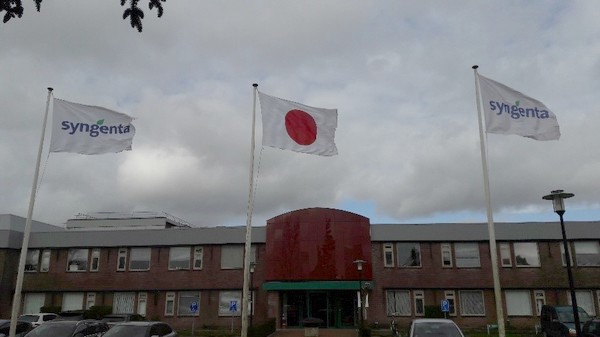A delegation (Ms. Kimiko Ishikawa, Ms. Machiko Naito and Mr. Hisaya Kakiuchi) from the Japan Association for Techno-innovation in Agriculture, Forestry and Fisheries (JATAFF) was visiting the Netherlands on February 25th. The delegation received a presentation from marketing and regulatory officers of Flowers and Vegetables seeds business at the Syngenta site in Enkhuizen. JATAFF’s purpose of the visit was to learn more about recent plant variety protection (PVP) developments for ornamentals, vegetables and field crops. The focus of the discussion was on variety protection in Japan and infringement of the Plant Breeder’s Right in general.

Japan flower market
Marketing Manager Michael van Baekel gave a presentation about the team that is responsible for Syngenta Flowers activities in Japan. “We see a saturation in Japanese flowers consumption for a few years now. Japan has a very high urbanization rate of over 90%, against a global 55% average. There simply isn’t much outdoor space for gardening for many Japanese citizens. Under these challenging market circumstances, seed companies like Syngenta do not only market via the traditional value chain (breeder, distributor, young plant raiser, grower, retail, consumer) but also interact directly with major retail business chains.” Next to retail cooperation, the landscaping business offers increasing opportunities for the flower business. This market comprises theme parks like Disney, greening companies and are recently fueled by the coming Olympics in Tokyo this summer.
Syngenta also presented their Vegetalis portfolio. This homegrown vegetable assortment is typically suited for a densely populated urban areas like Japan. On smaller balconies it is possible to enjoy flowers and grow your own healthy snacks simultaneously. This product portfolio seamlessly adapts to the Japanese culture with long working days and less time and space to enjoy garden life and grow vegetables at home.

Innovation relies on protection of IP
Innovation relating to plant and seed development includes both conventional breeding, modern breeding techniques and methods of genetic modification. Modern techniques to create genetically optimized crops require substantial investment and lengthy development programs. As the resulting high-tech products are sometimes easy to copy by simple propagation, robust Intellectual Property (IP) systems are required to protect these investments.
Hans Mulder, Syngenta’s Vegetables and Flowers Global Portfolio Lead for Plant Variety Registration & Protection (PVR/PVP), explained the way IP protection is organized within Syngenta and noted that local sales teams, royalty offices or organizations like the Anti Infringement Bureau usually are the first to notice infringements or illegal activities. AIB is an international association representing the major companies in the vegetable seed industry whose member companies are committed to support sustainable horticulture through innovation in vegetable breeding and seed production.
In floriculture business, one of the organizations in the field of breeders’ right, licensing agreements, monitoring and royalties is RAI. The Royalty Administration International helps protect Intellectual Property.

The delegation of JATAFF with Syngenta’s registration team for vegetables and flowers
Efficient IP systems are balancing the interests of inventors and society, creating incentives for innovation and fostering the dissemination, integration and adoption of new technology. Syngenta advocates realistic, science-based regulatory frameworks that allow farmers access to safe and efficient agricultural technologies.
 Syngenta Flowers
Syngenta Flowers